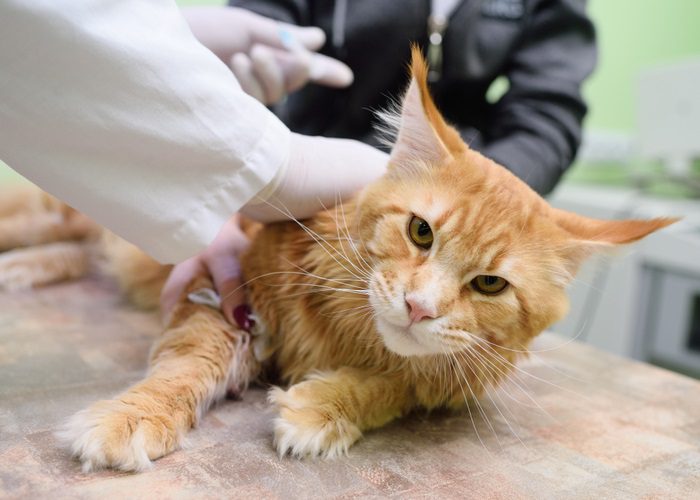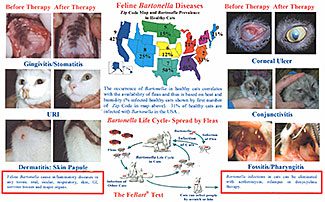
Lymphoma in cats: symptoms and treatment
Is the cat lethargic, refusing food, losing weight and breathing with difficulty? It is worth alerting, since the diagnosis may not be the most rosy – lymphoma. How to conduct an accurate diagnosis and is it possible to help a pet?
Contents
Lymphoma in a cat: what is it
Lymphoma, or lymphosarcoma, is a group oncological diseases lymphatic system. And the most commonly diagnosed cancer among all types of feline cancer. Depending on the localization, experts distinguish several of the most common diseases:
- Alimentary lymphoma. It affects the gastrointestinal tract, and today it is the most common type of disease.
- mediastinal lymphoma. Occurs in the chest.
- Multicentric lymphoma. It is multifocal, meaning it affects more than one organ.
Lymphomas in the chest and other organs are associated with feline viral leukemia (feline leukemia, FeLV, FLV) and feline immunodeficiency virus (FIV, FIV). Today, these viruses are much less common than they used to be, thanks to leukemia vaccination, FIV testing, and isolation of already infected animals. Therefore, these types of lymphoma are much less common than gastrointestinal lymphoma.
Reasons for the development of lymphoma
It is difficult to name any individual factors, since in most cases the development of an oncological disease is a complex process that leads to a malfunction in the body and the degeneration of healthy cells into tumor cells. However, the following circumstances can provoke the development of oncology:
- viral leukemia cats;
- feline immunodeficiency virus;
- chronic inflammation;
- adverse effects of the environment – ultraviolet, ionizing radiation;
- inhalation of tobacco smoke;
- decreased immunity – due to stress, poor nutrition, inappropriate conditions of detention.
Symptoms of lymphoma
With the following symptoms, you should not postpone a visit to the veterinarian:
- poor appetite;
- weight loss;
- lethargy;
- fatigue;
- anemia;
- edema.
Specific signs are characteristic of certain types of the disease. With alimentary lymphoma, a pet is usually observed [2]:
- vomiting;
- constipation or diarrhea;
- loss of appetite or, conversely, an increased feeling of hunger;
- thickening of the intestine, an increase in the nodes of the abdominal cavity (seen by the results of ultrasound).
With mediastinal lymphoma, it becomes difficult for a cat to breathe due to compression of the lungs.
Diagnosis of lymphoma
Early diagnosis and timely treatment increase the chances that the cat will live comfortably for several more years. The main thing is not to miss the moment.
Most of the symptoms described above are characteristic not only for certain lymphomas, but also for other diseases. Therefore, to make an accurate diagnosis and determine the stage of lymphoma, a complex multi-stage diagnosis is needed, which includes:
- examination and palpation;
- surrender blood tests, urine;
- cytological examination;
- Ultrasound;
- CT scan;
- x-ray studies;
- biopsy.
Only after careful carrying out of all diagnostic manipulations can a veterinarian make a diagnosis, determine a treatment regimen and make further predictions.
Lymphoma treatment
The goal of treatment is to reduce the number of tumor cells and achieve remission for as long as possible while maintaining the animal’s quality of life. The course of treatment usually consists of various schemes of systemic chemotherapy. Depending on the location and stage of the lymphoma, this may be a combination of different drugs that are administered both orally and intravenously for a certain period. In some cases, surgery is required, for example, to eliminate intestinal obstruction or to remove large neoplasms.
It is important to understand that the effectiveness of treatment directly depends on the stage at which the disease was detected.
Predictions: how long will a cat diagnosed with lymphoma live
According to the cellular composition, all lymphomas can be divided into [1]:
- sluggish (indolent, small cell) – they develop slowly and give more chances for a favorable prognosis;
- aggressive (large cell) – grow rapidly and require immediate treatment, the chances of survival with these lymphomas are lower.
The probability of a positive outcome and the duration of remission depend both on the cellular composition of the lymphoma and the stage of the disease, as well as on a number of other factors. For example, on the location of the tumor, the presence of concomitant infections, the individual response to chemotherapy, etc.
With the right treatment, cats with indolent lymphoma can live an average of 2 to 4 years. With large cell lymphoma, the chances of recovery or long-term remission are lower.
Prevention of lymphoma
It is impossible to prevent the disease, but it is possible to reduce the risk of its occurrence. For this you need:
- be sure to vaccinate and revaccinate against feline leukemia;
- if possible, limit contact with unvaccinated street cats, which are highly likely to be infected with FIV or FeLV;
- do not smoke where the cat lives;
- regularly – at least once a year, and cats from 7 years old – twice a year medical checkup with palpation and blood tests.
Forewarned is forearmed. The most important thing is not to miss vaccinations and prophylactic appointments with a veterinarian, and if any atypical symptoms are found, consult a doctor as soon as possible.
See also:
- Tips for Keeping Your Kitten Healthy
- Giardia in cats: causes, symptoms, diagnosis and treatment
- Cardiomyopathy and other heart diseases in cats: symptoms and treatment





